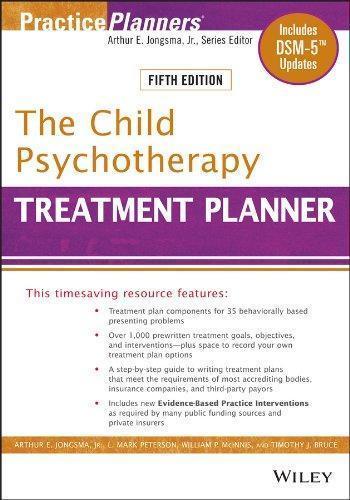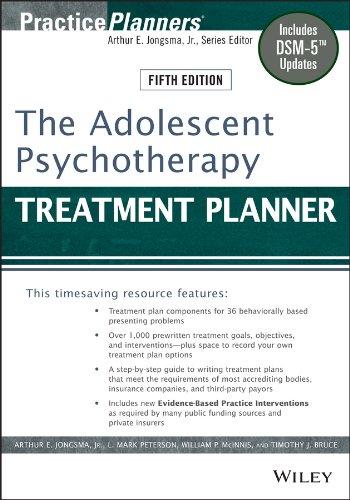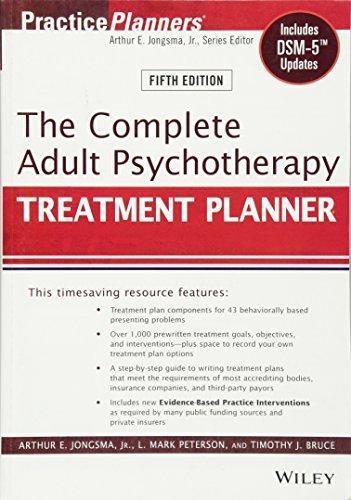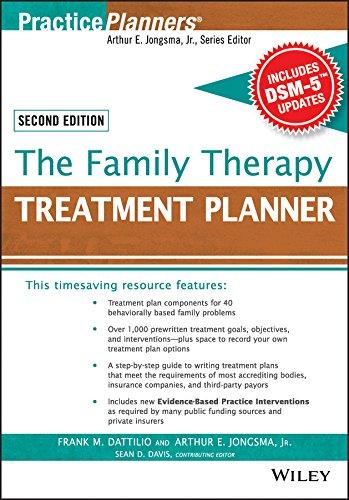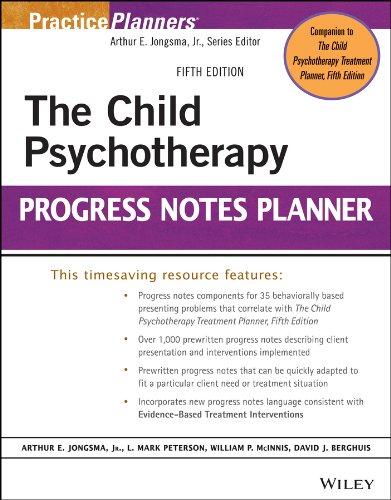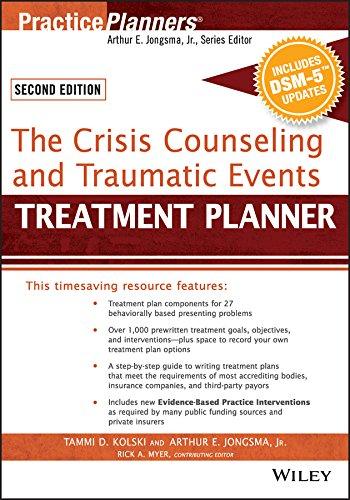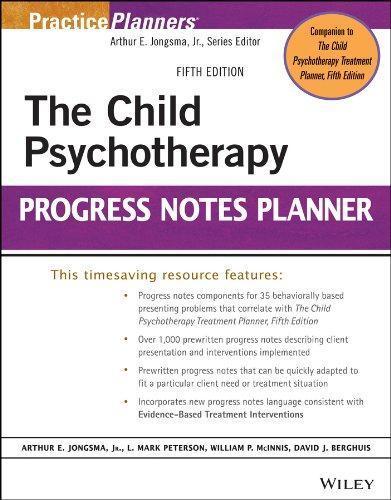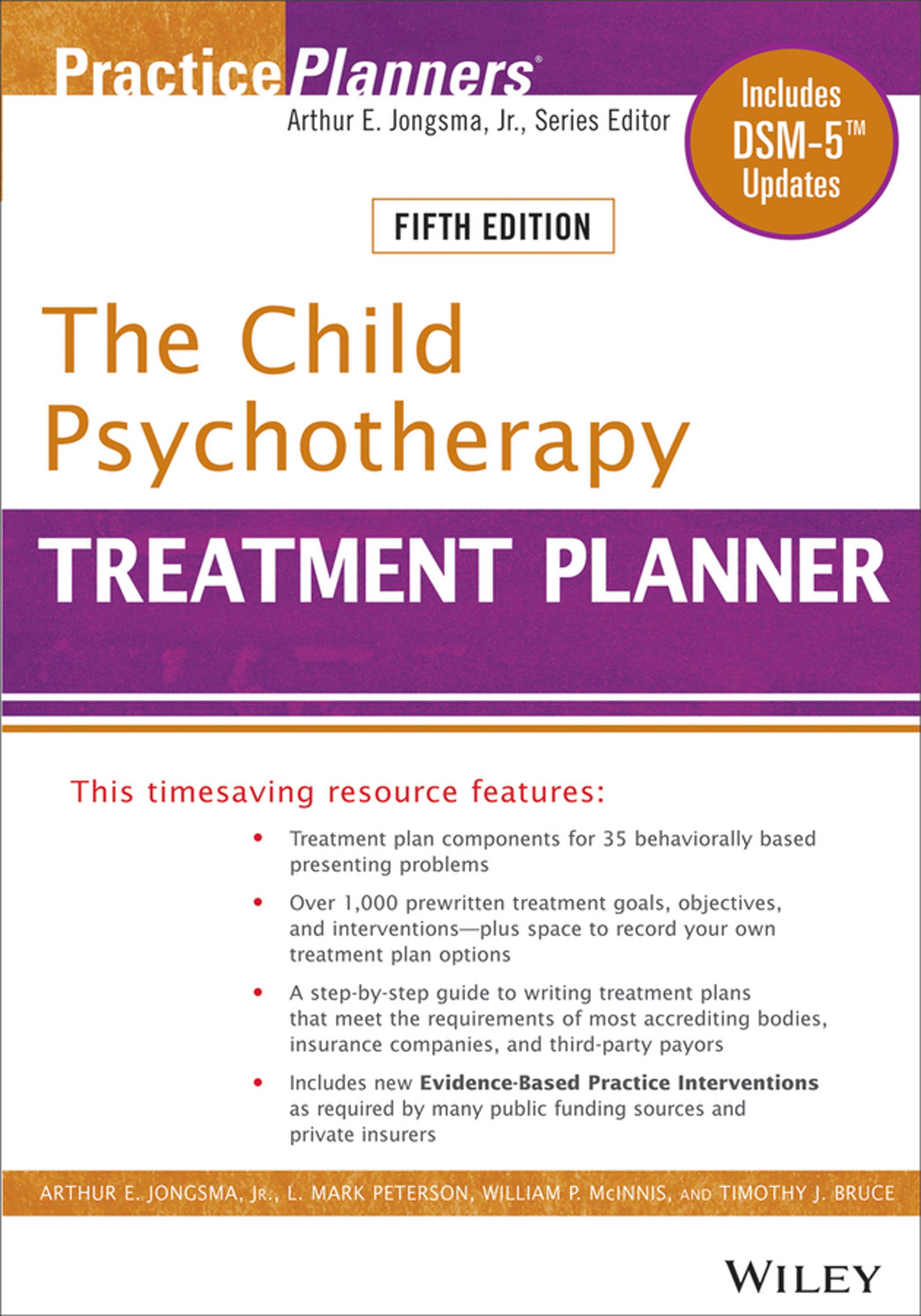INTRODUCTION
ABOUT PRACTICEPLANNERS® TREATMENT PLANNERS
Pressure from third-party payors, accrediting agencies, and other outside parties has increased the need for clinicians to quickly produce effective, high-quality treatment plans. Treatment Planners provide all the elements necessary to quickly and easily develop formal treatment plans that satisfy the needs of most third-party payers and state and federal review agencies.
Each Treatment Planner:
• Saves you hours of time-consuming paperwork.
• Offers the freedom to develop customized treatment plans.
• Includes over 1,000 clear statements describing the behavioral manifestations of each relational problem, and includes long-term goals, shortterm objectives, and clinically tested treatment options.
• Has an easy-to-use reference format that helps locate treatment plan components by behavioral problem.
As with the rest of the books in the PracticePlanners® series, our aim is to clarify, simplify, and accelerate the treatment planning process so you spend less time on paperwork and more time with your clients.
ABOUT THIS FIFTH EDITION CHILD PSYCHOTHERAPY TREATMENT PLANNER
This fifth edition of the Child Psychotherapy Treatment Planner has been improved in many ways:
• Updated with new and revised evidence-based Objectives and Interventions
• Revised, expanded, and updated the Professional Reference Appendix B
• Many more suggested homework assignments from the companion book, The Child Psychotherapy Homework Planner, have been integrated into the Interventions
• Extensively expanded and updated self-help book list in the Bibliotherapy Appendix A
• New Recovery Model Appendix E listing Goals, Objectives, and Interventions allowing the integration of a recovery model orientation into treatment plans
• Addition of a chapter on Overweight/Obesity
• Renamed several chapters: Anger Management is now Anger Control Problems, Autism/Pervasive Developmental Disorder is now Autism Spectrum Disorder, Mental Retardation is now Intellectual Developmental Disorder, and Social Phobia/Shyness is now Social Anxiety
• Integrated DSM-5 /ICD-10 diagnostic labels and codes into the Diagnostic Suggestions section of each chapter
• Added Appendix C with a listing of other professional references for cited books and articles not referenced in Appendix B
• Added Appendix F for listing an index of sources for assessment tests and interview forms cited in the chapter interventions
Evidence-based practice (EBP) is steadily becoming the standard of care in mental healthcare as it has in medical healthcare. Professional organizations such as the American Psychological Association, National Association of Social Workers, and the American Psychiatric Association, as well as consumer organizations such as the National Alliance for the Mentally Ill (NAMI), have endorsed the use of EBP. In some practice settings, EBP is becoming mandated. It is clear that the call for evidence and accountability is being increasingly sounded. So, what is EBP and how is its use facilitated by this Planner?
Borrowing from the Institute of Medicine’s definition (Institute of Medicine, 2001), the American Psychological Association (APA) has defined EBP as “the integration of the best available research with clinical expertise in the context of patient characteristics, culture, and preferences” (APA Presidential Task Force on Evidence-Based Practice, 2006). Consistent with this definition, we have identified those psychological treatments with the best available supporting evidence, added Objectives and Interventions consistent with them in the pertinent chapters, and identified these with this symbol: . As most practitioners know, research has shown that although these treatment methods have demonstrated efficacy (e.g., Nathan & Gorman, 2007), the individual psychologist (e.g., Wampold, 2001), the treatment relationship (e.g., Norcross, 2002), and the patient (e.g., Bohart & Tallman, 1999) are also vital contributors to the success of psychotherapy. As noted by the APA, “Comprehensive evidence-based practice will consider all of these determinants and their optimal combinations” (APA, 2006, p. 275). For more information and instruction on constructing evidence-based

psychotherapy treatment plans, see our DVD-based training series entitled Evidence-Based Psychotherapy Treatment Planning (Jongsma & Bruce, 2010–2012).
The sources listed in the Professional Reference Appendix B and used to identify the evidence-based treatments integrated into this Planner are many. They include supportive studies from the psychotherapy outcome literature, current expert individual, group, and organizational reviews, as well as evidence-based practice guideline recommendations. Examples of specific sources used include the Cochrane Collaboration reviews, the work of the Society of Clinical Psychology (Division 12 of the American Psychological Association), and the Society of Clinical Child and Adolescent Psychology (Division 53 of the American Psychological Association) identifying research-supported psychological treatments, evidence-based treatment reviews such as those in Nathan and Gorman’s A Guide to Treatments That Work (2007) and Weisz and Kazdin’s Evidence-Based Psychotherapies for Children and Adolescents (2010), as well as evidence-based practice guidelines from professional organizations such as the American Psychiatric Association, the American Academy of Child & Adolescent Psychiatry, the National Institute for Health and Clinical Excellence in Great Britain, The National Institute on Drug Abuse (NIDA), the Substance Abuse and Mental Health Services Administration (SAMHSA), and the Agency for Healthcare Research and Quality (AHRQ), to name a few.
Although each of these sources uses its own criteria for judging levels of empirical support for any given treatment, we favored those that use more rigorous criteria typically requiring demonstration of efficacy through randomized controlled trials or clinical replication series, good experimental design, and independent replication. Our approach was to evaluate these various sources and include those treatments supported by the highest level of evidence and for which there was consensus in conclusions/ recommendations. For any chapter in which EBP is identified, references to the sources used are listed in the Professional References Appendix B, and can be consulted by those interested for further information regarding criteria and conclusions. In addition to these references, this appendix also includes references to Clinical Resources. Clinical Resources are books, manuals, and other resources for clinicians that describe the details of the application, or “how to” of the treatment approaches described in a chapter.
There is debate regarding evidence-based practice among mental health professionals who are not always in agreement regarding the best treatment or how to weigh the factors that contribute to good outcomes. Some practitioners are skeptical about changing their practice on the basis of research evidence, and their reluctance is fueled by the methodological challenges and problems inherent in psychotherapy research. Our intent in this book is to accommodate these differences by providing a range of treatment plan options, some supported by the evidence-based value of “best available research,” others reflecting common clinical practices of
Another random document with no related content on Scribd:
whilst Adam had yielded to them, and been beaten down at every point. It hurt the man to know this, and he took every opportunity of avoiding Mr. Drummond. He succeeded in doing this while at his work, but met the person he least wished to see when and where he least expected to find him.
CHAPTER V.
THE NEW MANAGER TAKES ADAM UNAWARES.
IT was Saturday afternoon and Adam Livesey had taken charge of all his children except the eldest, who was staying at home to fetch and carry and to be made generally useful during the weekly "cleaning up" for Sunday. The one left behind cast longing glances after the little troop who, under father's convoy, were being taken out of mother's way. It was rather hard lines for the solitary little damsel, who would have so enjoyed a run in the park with the rest, but who, being ten years old and the eldest of six, mostly boys, paid the penalty of being a sort of household drudge.
The mother could hardly be blamed for this, since, as she truly said, her own work was never done, and in the pinched face and often peevish tones of Mrs. Livesey there was not much to remind any one of rosy-checked Maggie Allison. But she might have made her willing little helper much happier, if she had only led the child instead of driving her, and given kind words in place of perpetual fault-finding.
As to Adam, he silently rejoiced in being able to take so many of the youngsters into the somewhat grimy enclosure called the "People's Park." There was plenty of space for play, the air was as fresh as any in the neighbourhood, and there were swings, trees and flowers, though to pluck a leaf or blossom with clean gloves on would have destroyed their purity for ever.
However, the park was not so much for the clean-gloved people, so that mattered little; and it was a vast source of enjoyment to many whose hands were innocent of covering, and alas! their feet too, in many cases.
Before lifting the baby in his strong arms, Adam whispered a promise in the ears of Maggie junior, which brought a flush of gladness to her rueful face, and would do much to cheer her during her hours of toil. Then he went off to the park with his youthful following.
The day was pleasant, the breeze just fresh enough to make walking delightful; and the spirits of the children infected their father.
Mrs. Livesey often said that Adam gave them more words during one walk than anybody else got out of him in a week; but then she should have remembered that she talked more than enough for them both. Even patient Adam had been driven to say that there was no edging in a word beside her. Anyway, he always answered the little folks pleasantly and kindly, and the walk to the park seemed short to them all. Once there, the four went off to the swings, and baby being asleep, Adam sat down on a bench well sheltered by a background of shrubs, lest his smallest charge should suffer by exposure to the breeze, and began to think things over.
When with the children, the man's mind was often sorely perplexed. He loved them dearly, and, in spite of the change in his wife's looks, he had never varied in his affection for her. True, she was not just the Maggie she used to be. But was he not to blame? If he had not married her, somebody brighter and better off might have made her his wife. Was it not wrong of a man who was so little in himself, and who had nothing else, to marry at all? And would the children have no better prospect to look forward to? He could see nothing tempting before any of them. He was only forty years of age now, and his wife thirty-four, but how much older both of them looked than their actual ages!
Just at this moment Adam heard voices behind the shrubs. One was that of a girl, and as she passed on, she gaily hummed a tune. It was one that his wife used to sing in her clear fresh voice, which he had so loved to hear, during their brief courtship and early married days. The sound actually brought moisture, of which he felt thoroughly ashamed, to Adam's eyes, and he was gently disengaging one hand so as to wipe it away, when a different voice addressed him by name. He recognised it in a moment. It was that of Mr. Drummond, and he was by no means glad to hear it, though the words were friendly and the tone pleasant.
"I am glad to see you here, Livesey," said the manager. "You are a wise man to use your half-holiday in this way. One would think that most workers who spend so much time in places like the cotton mill or smithy would be glad to get the smoke and steam blown out of them, now and then, by such a sweet breeze as this."
Adam gave a sort of indistinct murmur of assent, said something about bringing the children out, and "cleaning day," and made as if he would have risen.
He did not want the manager's company, but the man's instincts were ever on the side of courtesy, and he never failed in civility to those whom he had been used to call his "betters."
Mr. Drummond saw the movement, and laying his hand on Adam's arm, said, "Do not get up, please. You might rouse that little sleeper. What a pretty creature!" And he looked admiringly at the child, whose forehead was shaded with dark rings of silky hair, and her long lashes rested on the flushed cheeks.
"By your leave," added the manager, "I will sit down beside you."
What could Adam say? Certainly he could not refuse, for the seat was as free to Mr. Drummond as to him, and there was room for five occupants. Then, too, the feeling of antagonism which he had cherished towards Mr. Drummond was beginning to give way already. That gentleman's frank admiration of his youngest born touched Adam in his tenderest point, and his politeness had gained him a further advantage.
"To think he should say 'By your leave' to me. Why, one of the men wouldn't have troubled himself to do that, but would have flung himself down, and maybe stuck his feet up with his shoe soles against my clothes, and whether I wanted his company or no."
Adam's cogitation was perfectly correct, and by the time he came to the end of it, he could say with truth, "Sit down, sir, by all means. There's lots of room. Besides," he added, "nobody has any call to ask leave."
"Maybe not, in one sense, and so far as occupying a seat goes. But when a person you know is sitting quietly
and alone, it is perhaps as well to find out whether your company will annoy him or not."
"I suppose that would be so if it were a gentleman," returned Adam, slowly.
"Do you mean a gentleman sitting?"
"Yes. I reckon very few folks would trouble about manners to a man o' no account like me."
"Then it would be their own loss. It always does harm to those who miss a chance of showing civility. I had a very good mother, Adam. Not a fine lady, according to the world's notion, but a hard-working woman, and she taught me this lesson, that one-sided politeness is not worth much. It should go everywhere, and be practised all round."
"You learned that lesson right off, and you've remembered it, sir," said Adam, on whose face an expression of interest was already manifest.
It was very curious, but during the brief moments that the two men had spent together, the manager succeeded in touching the most sensitive chords in the striker's nature. His love for his children, his own low self-estimate, and his memory of the mother who "gave up."
Mr. Drummond went back to the first. Bending over the lovely unconscious baby-sleeper, he touched its soft cheek with his lips, too gently to rouse it, however, and then looking into Adam's face with a smile he asked, "How old is she?"
"Fifteen months. She can toddle about a bit, but not walk far; so I have to carry her, you see."
"I have one the same age. We lost the next oldest."
"And so did Maggie and me. Maggie's my wife, sir."
"How many have you altogether?"
"Six, and the eldest is just turned ten, poor little lass!"
Mr. Drummond put two and two together, and guessed the meaning of these last words. "I suppose she is at home helping her mother, and would have liked to be here."
"That's just it, sir. The rest are here. They will come to me when they're tired."
Adam would have liked to ask how many children Mr. Drummond possessed, but his shyness overcame him, and he remained silent. The manager wanted to draw him out a little, and thinking the best way was by being communicative, said, "You are twice as rich as I am, Livesey."
"Then you have three children. I was just wondering. But you are a many times as rich as I am in other ways— learning and place, money and manners. I have very little of anything except children. Seems queer now, doesn't it?"
"It does. People often puzzle over that subject, and wonder that the meat and the mouths get sent in different directions. But you must not fancy that I am a rich man, or that my way has been made smooth for me."
Adam never could tell how it was that he managed to get out the question, but he next found himself inquiring about Mr. Drummond's mother, to whom he had alluded as "a hard-working woman."
"I beg your pardon, sir," said he, "but was your mother one that 'gave up'?"
The manager hardly understood Adam's meaning. He hesitated, then said, "Gave up what?"
Livesey's features worked in a most peculiar manner, as if he might be engaged in the manufacture of words by which to make his meaning clear. After a struggle, he answered, "I'm not sure whether I can tell you, sir. But mother was left a widow with three of us, and nobody to help, and she was like somebody that has too much weight on them. She bent under her troubles, and had a grave face and a down-trodden look and way with her. Things were very dull at our house, and I am sure it was because, as mother said, she 'just gave up.'"
By dint of thinking and questioning, Mr. Drummond at length realised Adam's meaning. "I see," he said. "Now I can answer you. My mother would have been one of the last to give up. She worked bravely and steadily. She set us an example of cheerfulness, and cheered us when we were inclined to break down. With a mother leading her children in the right way, and always looking up with her bright face heavenward, we children could hardly help following, could we?"
"But what did she look up for, sir?"
A glance at the questioner showed Mr. Drummond that Adam made the inquiry in perfect good faith.
"I do not mean that her eyes were always looking up. She had to keep those on her work, in a general way. I meant that her thoughts were turned heavenwards. She remembered God's many promises to the weary, the troubled, the widow and the fatherless, and believing that
they were meant for her, and that He was faithful that had promised, the faith cheered her, and she looked for their fulfilment, and taught us to do the same; only I, for one, was a careless scholar."
Adam answered something, but the words meant little.
The slight allusion made to God's dealings with His children had carried the striker out of his depth already.
Mr. Drummond perceived this, and began to question Adam in turn. He was interested in him, and showed it.
"It's a queer thing for anybody to want to know about me. I told you about mother. She wasn't like yours. I might ha' been something better than a striker if I'd had a chance. I had it in me to learn, and I was never afraid of hard work. Maybe, if I hadn't got married after mother died, I should have saved money and gone in for a bit of learning; but I'd been slaving on for years, making no friends, because she couldn't abide neighbours. A big town's an awful lonely place if you've nobody belonging to you. I couldn't stand the loneliness. Then it's hard work starting again at school after you're grown up; so I thought, 'There are lots more in the same fix as I am. I may as well settle down to it like the rest,' and I did.
"I had used to work for mother, you see, and when she was gone, it seemed so queer to have all my wages for myself, and be slaving away for just Adam Livesey. There was a girl next door—"
Here Adam's face began working again, as the image of Maggie as she then was came into his mind.
"Never mind," he continued, almost fiercely. "She has been my wife for a dozen years, and sometimes I wish she
hadn't. Nothing the matter with her, mister. Don't you go thinking that. Only marrying me turned as pretty a lass as you would wish to see into a mother of seven—one dead, you know and a thin, weary woman, with too many children, too much work, and far too little money to make things comfortable. Maggie couldn't go out to work and help. How could she, with seven of 'em born in ten years? And one pair of hands! I say, sir, it's wonderful she has managed as well as she has done. Don't you think now I did wrong by that pretty young woman by marrying her? If she hadn't had a place to lay her head in, it would ha' been different. But she had a nice home with her mother, and used to sing like a lark up and down their house, and for a good while after she was married to me. She never sings now. There's a man at Rutherford's that has a bird. It used to be in a large place, where it could fly about and hardly know it was in prison. Something happened to the man who owned the place, and the birds were sold. This man bought the one I spoke about. It was the grandest singer, he said. He put it in a little cage; but though he gave it the primest spot in the cottage, it never sang any more.
"When he told me, I said I was sorry to hear it, but I thought to myself, 'That's just like my poor Maggie.'
"Well, I've had my share of slaving too, but it came natural. And plenty of them to slave for, as you may see, sir."
Adam gave a grim wintry smile as he alluded to the number of his olive branches, but at the same time he pressed the sleeping child a little more closely, as if to say, "I should not like to part with one, for all that," and relapsed into silence.
CHAPTER VI.
"THE THIN END OF THE WEDGE."
ADAM LIVESEY'S story was not told all at once and straight forward as it is here put down, but jerked out at intervals in a spasmodic fashion, and a few words at a time, in response to much kindly questioning. Then the man seemed half ashamed of having been drawn out, and shrank into himself again.
But Mr. Drummond had taken a liking to Adam. He felt strongly for the man, with his cravings after a higher and better life, his ignorance of the greatest yet simplest truths. He was profoundly touched at the wealth of fatherly tenderness that lay deep down in his heart, at his painful sense of wrong done to the pretty bright-eyed girl who had so sadly changed since she had linked her fate with his, at the manifest hopelessness which weighed down his whole nature.
Moreover, the manager had observed Adam at his work, and noticed how faithfully it was performed. He had found out that while many laughed at his grave, silent ways, all respected "the poor chap," as they called him, even while they pitied him for having "no pluck to help him to stand up for himself."
Mr. Drummond, in his own mind, compared Adam to those Gentiles of whom St. Paul wrote in the Epistle to the
Romans. "This man," he thought, "is living in the heart of a great city and in the midst of a Christian nation. And yet, while he is as ignorant as a heathen, he has been doing by nature the things contained in the law. He has a tender, though not an enlightened conscience, and has obeyed its dictates and been a law unto himself. If only the gospel message could be brought home, first to his ears, and then by the blessed influence of the Holy Spirit to his soul, what a different life would Adam Livesey's become! Oh that into his heart might shine the light of the glory of God, in the face of Jesus Christ.
"And," he added the silent but heartfelt prayer, "oh that I might be made the instrument in leading him to the one and only Saviour!"
If the baby had waked up in a very short time, all this talk would have been impossible, but the words which take long to write are quickly spoken.
"I cannot help thinking, Adam, that it is not too late for you to better your position. I know you can in one sense, if not in another."
"It's no good talking, sir. What's done is done. I'm forty years old, and I'm just where I was at twenty-five, as far as wages go. I had two to feed then. I've eight now. Things are past mending for me. I'm o' no account in the world, and I shall never be of any."
"Of no account! I cannot agree with you there. You are of account, as a workman. What would become of Rutherford's if all such as you were withdrawn? There are many idle, useless people in the world, who could be better spared in a batch, than one man who does as honest a day's work as Adam Livesey."
In spite of himself, Adam's deep set eyes were kindled into an expression of pleasure, but he did not speak.
"Are you of no account to the wife and little woman at home? To the playing children, whose voices sound very full of music to me, as the breeze wafts them this way? Are you of no account to that sweet little sleeper who rests so trustfully and safely in her father's arms? Adam, your heart must tell you that there are many by whom you could be ill spared."
"Yes," he answered, simply. "They would want me."
"And though poor Maggie may not have cheeks as round and rosy, and her voice may not often be raised in song, I daresay she has a warm heart at the bottom. Depend on it, Adam Livesey, she keeps the best corner of it for you, though many cares prevent her saying much about it. Would she let anybody call you names behind your back?"
The striker's face assumed a look of positive amusement, as he said, "It wouldn't be good for 'em to try that game on with Maggie."
"Does she ever keep the best bit for your dinner, and try to go without any of it herself? I say 'try,' Adam, because I know you would not let her."
"To be sure she does. That's just Maggie. Why, sir, you might have seen for yourself."
"And do you think, if it could be possible for any one to say, 'Mrs. Livesey, if you would like to go back twelve years, you can. You shall be the girl Maggie again, only you must say "good-bye" to Adam and these six little plagues who make you so much work, and are so full of wants. Say the
word, take back your youth and your roses, on condition that you part with husband and children.' Would she say the word, Adam?"
The man was strangely moved. The rugged features worked again, and showed the effect of Mr. Drummond's questioning. "No, no," he cried, "Maggie may scold a bit and say sharp words, then wish she hadn't, but nobody would drag that word out of her."
"Here's a nice man to say he's of no account. Why, Adam, you are a regular fraud, to set up as a person that nobody would miss."
Mr. Drummond laughed cheerily, and his hearer caught the infection. "I'm afraid I haven't come out very well in this line," he said. "I shall be getting conceited just now, and forget to give up."
This was the effect the manager wished to produce. He wanted Adam to take a higher and more just view of his calling and responsibilities. He wanted first to raise his selfestimate, to encourage efforts at self-improvement; above all, to lead him to a knowledge of his spiritual need, and the all-sufficiency of Christ to meet it. But this last part of the subject would have to be carefully approached. There must be no plunging recklessly into it. He must prove his goodwill to Adam, and thus secure his confidence, and he was a good deal astonished at the progress already made.
The manager had no thought of meeting Adam when he did, but he had been longing for such an opportunity, and was thankful for such a fulfilment of one of the desires of his heart.
"You think, then, I did not do wrong by marrying Maggie?" said Adam, interrupting Mr. Drummond's thoughts
by the inquiry.
"I imagined that question had been settled a few minutes ago."
"I'm glad you think so, sir. It has troubled me for a long time, ever since her mother went away to live beside her elder daughter. She used to be next door to us, but the children began to run in and out too often, and Maggie was p'raps a bit too having, seeing her mother was independent like. Maggie will have a matter of three hundred pound when the old lady dies, so I may well wonder she married me."
Adam was relapsing, and would be o' no account again directly.
"No doubt she was, and is, very fond of you, Adam. You have proved this by your own evidence, and I was sure of it almost without that. I do not think I durst have felt certain if you had been like some of the men whose wives are waiting for them at pay time. You do the best you know how to do, and Maggie must respect you."
At this instant the baby opened her dark eyes, then looked into Adam's face, and began to laugh and struggle to be on her feet. Just then, too, the other four children, tired of the swings and wanting a change, approached the bench on which they had left their father.
The sight of the gentleman checked their rapid advance, and they hung shyly back. But Mr. Drummond encouraged them, saying that he wanted to see Adam's flock, and at the father's call they came to be inspected.
The manager congratulated Adam on their healthy looks, and the signs of a mother's care to be seen in their
neatly mended clothing. Then he asked, "What school do you go to on Sundays?"
Adam answered for the children. "They don't go anywhere, sir. They get schooling enough on week days, when they must go. I'm glad for them to learn, but they want their little heads to rest one day in the seven."
It was a good thing that baby became obstreperous, and insisted on joining her elders on the ground. So they formed themselves into a bodyguard for the youngest darling, and led her to the soft grass on the other side of the walk, where they enticed her to join in gambols contrived for her special benefit.
"We fathers like to look on such pictures," said Mr. Drummond, still lingering by Adam's side, and pointing to the children.
"We do, sir."
Mr. Drummond, by coupling his own interests with those of Adam, had forged another connecting link between them.
"By the way, Livesey, where do you and your family go on Sundays?"
The man's first inclination was purposely to misunderstand the question and say, "Sometimes to this place, but mostly we stop about home." But the striker's nature was a true one, and he hated himself for thinking of such a paltry subterfuge. So he replied,—
"To say the truth, sir, we don't go to church or chapel any more than the children go to school. I never was in a religious way myself, and Maggie, though she had been used to go to a place of worship when she was in service,
never had much heart for it. She liked better to take a walk with me, and show her pretty face beside my ugly one. She wore pretty bonnets too, in those days. If we did not trouble about church before, we weren't likely to put ourselves out when there was a baby to mind. So we keep to a church with a chimney, though by that we don't mean what your public-house men do. It's just our own little place you would find us in, mostly."
"I wish you would go for a time or two to hear a gentleman I know something about," said the manager.
"I don't know why you should trouble about where we go, sir," said Adam, with the least pleasant manner Mr. Drummond had noticed. "What matter does it make whether a poor chap like me spends his Sunday at home or in the streets, so long as he isn't doing any harm, or drinking himself into a—"
"Do not say 'beast,'" remarked Mr. Drummond, with a good-humoured smile.
"I won't. I was stuck for a word, and didn't like to say that, seeing it isn't fair on the beasts, that only drink when they're thirsty, and know nothing about reeling zig-zag to their kennels. Maybe I might ha' said drinking till they have to stay from work on Monday, to sleep themselves sober. I reckon I've a right to spend my Sunday as I like, so long as I'm always up to time at Rutherford's."
It would have been strange if there had not been a spice of doggedness somewhere in Adam Livesey's composition. The man who had all his life manifested such firmness in resisting the temptations to self-indulgence, such steadiness and industry in his humble calling, such patient consideration for mother and wife in turns, was
almost certain to carry some of these excellencies to the extreme. His very firmness was sure to have a stubborn side, and Mr. Drummond detected its whereabouts.
Adam held strong views with regard to outside interference from his employers, and, to use a homely phrase, "his back was up" the moment the manager made an allusion to the mode in which he and his family spent their Sabbaths. His tone was alike resentful and expressive of injury received, and the conversation had reached this point when Adam uttered almost the identical words with which this account of his life begins.
"I am never a minute behind my time, and I work as long as any man does in all the place. I never stopped a job by being off a single day when there was anything to do, and for what need this new man be poking and prying into what I do on Sundays? I've a right to do as I like, and I shall too, for all his meddling."
These were Adam's thoughts, and Mr. Drummond had little difficulty in reading them, though he answered only the words.
"It does not matter to me, in one sense," he said, "but it does in another. We have had a very pleasant talk together, and you have been kind enough to tell me a good deal about yourself and those at home. I know you are not reckoned a great talker, and so I felt your frankness the more. I cannot help seeing what a life of constant toil it has been, and, as a man who feels for and sympathises with his brother man, I thank God you have not made worse of things, either for yourself or those who depend on you for bread. I honour you for your patience, steadiness and industry, but you must not be offended if I wish for you
something better still. Do not think me a meddler for speaking of what is outside Rutherford's."
Adam felt a little ashamed. Mr. Drummond's politeness rebuked his ungracious manner and dogged utterance. He seemed to have read his thoughts too, and answered them, for had he not felt very angry with him for interfering with his freedom of action outside the works? He was, however, too confused to reply, and the manager added, "Once I was like you. I thought it was enough to give six days' work to my employers, and to be just in all my dealings, doing harm to no one. But I was led to see that I had to answer for more than my six days' work, that there were duties to God, my neighbour, and my own soul, that called for my urgent attention. I was very proud of the work done, but I forgot to be humble on account of what I left undone, or did amiss. There were calls which I had not answered, opportunities neglected, privileges despised, gifts received without thankfulness, and Sabbaths misused. Perhaps I turned them to more account than you do, for I was restless and eager to get on in the world. I often spent them in calculations and plans for bettering myself. I did not even rest, but I brought all the anxieties of the other six days into the Sunday. Then I was led to think and act differently."
Adam's dogged manner was all gone, charmed away he hardly knew how, and he was eager to hear more. But the children were coming, and the boom of a great clock was borne to their ears by a favourable breeze. This told the striker that Maggie would be expecting their return, and there was a good mile between the park and home.
Mr. Drummond rose from the bench also. "No time now to tell you what brought new life and light and joy to my life, Adam. But it was through a message which God was pleased to send me. And it is because my whole being has
been changed and made glad by it, that I want everybody else to have the same joy. The man who brought me the message is in Millborough now, holding some mission services. I wish you would go and hear him, Livesey. His name is Kennedy, and the room is in Aqueduct Street. Good-bye."
Mr. Drummond held out his hand. Adam was so astonished that at first he did not hold out his own, though not from unwillingness.
"Will you not shake hands, though I have been stepping on forbidden ground? I am not 'the manager' here, but with you as man to man."
If Mr. Drummond had after cause for fault-finding, it was certainly not on account of want of heartiness. The effects of Adam's grip, made his fingers tingle for some time. Then, after a farewell pat to the baby, and an acknowledgment of the striker's lifted cap, the manager walked rapidly away.
CHAPTER VII.
MAGGIE, HER BEST SIDE OUT.
Two pairs of eager eyes had long been on the watch, and two eager tongues loudly announced that "father" was coming, as Mr. Drummond approached his own doorstep.
Then there was a rush of the two pairs of feet belonging to the aforesaid, and the hall resounded with welcoming kisses and alternate expressions of delight that he had come at last, and of reproach that he had been so long absent.
The children's faces and voices were not the only ones that told of gladness when Mr. Drummond made his appearance. Their small hands, which had seized both his, were disengaged again. The father had plenty of loving caresses for his little people, but he did not overlook the mother's claims. Putting them aside for a moment, he passed his arm tenderly around her, as he said with a laugh, "Don't be greedy, darlings. Mother must have her share," and then affectionately kissed the fair face in which he could read a whole volume of glad welcome.
"You have thought me long, Edith, though you do not scold me for having kept you waiting."
"I sometimes make up my mind to lecture you, Robert, but when you come, I am so glad to see you that I forget the words I meant to say, and tell you this instead."
Mrs. Drummond's sweet face was so irresistible that again her husband bent his tall head to kiss it. The flush that overspread her cheeks was as bright as that on a girl's, but the colour faded too quickly. It was Robert Drummond's greatest trouble that his wife was not strong. Apart from this, no wedded couple could well be happier.
"Is Mr. Kennedy here?" asked the manager.
"No, but he will be before six o'clock. He must leave again by seven, to be ready for the service. So far, he says, few men have been at the room, though many women have attended. To-night, he hopes it will be the other way, as the
men have their half-holiday, and could well spend a portion of it at the mission service."
"If they would. But it is not easy to get them to think so. I have been trying hard to enlist one recruit, but I fear with little success."
Here the children put in their claim to the father's attention, and, as usual, not in vain. Mr. Drummond and the small people were soon in the midst of a romp, and it was hard to say whether they, he, or the mother who looked on, enjoyed it the most.
Then the youngsters were sent off to the nursery, and just after their departure, Mr. Kennedy arrived, and tea was brought in.
During the meal they said little. The mission preacher was tired, and needed to rest both voice and body before the evening's work should begin. But knowing Mr. Drummond's wish to be of use to the large body of workmen placed under his orders, he was most anxious to hear whether he had made any progress. He listened with deep interest to all the manager had to tell, and especially to his account of the recent conversation with Adam Livesey.
Mrs. Drummond's sympathies were also enlisted, especially by what Adam had said about his wife, and the change wrought in pretty Maggie. "You would be just the one to comfort the poor fellow, Robert," she said. "You could enter into his feelings as few men could. He is the same as that silent, rugged-looking workman about whom you told me, as having such a strange attraction for you. It was singular you should meet with him so unexpectedly, and have a chance to talk quietly about so many things."
"It was. We got on very well until I mentioned Sunday, and asked how he spent it. However, we parted good friends, and I have broken the ice between manager and man."
"You will not let it close up again," said Mr. Kennedy, and then he rose to take leave of his hostess.
Mr. Drummond was going with him to the Mission Room. When there, he looked eagerly at each new arrival, but was disappointed in his search for the face of Adam Livesey.
Adam's arrival at home was not marked by such pleasing features as that of Mr. Drummond. He was rather late, and the children, weary with play and the walk to and from the park, were getting fretful, baby included.
"If you didn't want your tea, you might ha' thought these poor little things would, let alone Maggie and me, after being at work all day," said Mrs. Livesey in no amiable tone. "You may well cry, baby. You're almost famished, and father has given you nothing, I'm sure."
Mrs. Livesey might well be sure on this point, for, seeing that Adam had taken no eatables in his pocket, and had handed every farthing of wages into her keeping on the preceding evening, it would have been difficult for him to feed the children.
He was going to say so, but he checked the inclination to defend himself, as he had done on many similar occasions. "She knows as well as I do," thought he. "It's only her way. Least said's soonest mended, and naught said needs no mending."
So, having carefully rubbed his shoes and seen that the youngsters did the same, he went through into the little
lean-to scullery to wash his hands. When he sat down at the table, he found his wife full of curiosity about the gentleman who, the children said, "had been sitting talking to father nearly all the time."
"Tom says he was a gentleman from Rutherford's, and that he saw him twice, on days when he brought your dinner. But I told him he must be wrong. No gentleman from Rutherford's would sit talking to a poor labourer like you."
"Tom was right. It was Mr. Drummond, the new manager."
"Well, I never! What's going to happen now? Whatever had he got to say?" inquired Mrs. Livesey, brimming over with curiosity.
"I can hardly tell you, Maggie. He said how pretty baby was, and he kissed her little face, and told me he had one like her at home, and he'd lost the next oldest, same as we did. I told him she favoured her mother, and what a bonny lass you were when I first knew you."
Mrs. Livesey stared in utter astonishment. What could possess him to begin talking such nonsense as that—he that went about in a general way as if he couldn't say "Bo!" to a goose. In the very depths of a heart not yet cold and dead, she was pleased at the nonsense, though she gave a little groan and replied, "You might well say 'was.' My pretty days have been over this long while."
"That's as folk think, Maggie;" and the poor fellow looked at her with a world of kindness in his eyes. Mr. Drummond's words had stirred him strangely, and made him see Maggie in a new light. He had made up his mind that she did not regard him as the thief who had stolen her
youth and beauty by bringing her to his own poor home, but as the husband whom she still loved better than herself, and as the father of her children.
Maggie plied him with many questions, but there was no longer any sharpness in her tone or unkindness in her words. Finally, she concluded that the new manager must be a very nice gentleman, and that something good might come of the meeting. Like Adam, she did not think much of being interfered with out of working hours. The very fact of Mr. Drummond's having talked about going to a place of worship, and such-like, inclined her to be suspicious. "If he had promised to raise your wages, there'd ha' been something to think about. Even a shilling a week would ha' been better than nothing."
"I don't suppose he could give me a rise, Maggie, though I daresay he would make things better for everybody if he could. You see I'm only a labourer, and I get same as the rest that do the same work."
"You do more and better, for you stick to it," said Maggie. "But there, it's no good talking."
At this moment, a smart rap at the door interrupted the speaker, and she went to open it. There stood two decently dressed men, strangers, one of whom said, "You'll excuse us disturbing you, missis, please, but there's a lot of us going round in twos, to ask our neighbours to come to the mission service to-night. You'll be kindly welcome, if you'll come, and your master, too. You'll hear something good."
"Eh, dear! It's all very nice, I daresay," replied Maggie, who was quite her best side out, "but I couldn't do it. Tomorrow 'll be Sunday, and Saturday night's the busiest in
the week, with six of 'em to tub, and ever so many things to do beside."
"Well, missis, I'm glad you see to keeping their little bodies clean and wholesome. It would be a good job if every house we'd looked into were as tidy as yours is. Folks say, 'Cleanliness is next to godliness,' but it don't do to stop at the cleanliness, does it, mate?"
The other man said, "No, that would be a bad lookout," and, turning to Adam, "Will you come along with us, mister?"
Adam shook his head, and Maggie said, "Thank you, we've both enough to do for to-night."
"Well, then, I'll just leave you this little paper. It will tell you all about the mission services. Time and place, and preacher, and everything. If you go to a church or chapel regular, I don't ask you to give up your own service for this. But if you don't happen to be fixed, look in at our place tomorrow. You're safe to have time, and you too, missis, when you have your Saturday's work done so early, and your kitchen floor so as one might eat one's dinner off it."
There was no being angry with such good-tempered, pleasant-spoken visitors. So Maggie took the little handbill and thanked them for it, saying, they would "see about it."
Not that either Adam or his wife had the smallest intention of going near the Mission Room, but they would not say so. They only wanted to rid themselves of their callers in a civil way, and without giving offence by a direct refusal.
So when, after a kindly "good night," the door closed behind the men, they considered they had done with them
and their errand also.
But they were mistaken.
CHAPTER VIII.
CALLERS AND COGITATIONS.
MR. KENNEDY, the mission preacher, had found out long before his visit to Millborough that those who would rouse spiritual sleepers to anxiety about the well-being of their souls, must carry the gospel invitation to their very doors. For this work messengers were needed. Moreover, these required special qualifications. The message must be lovingly delivered by persons who had themselves experienced its importance and knew its preciousness.
There were doubtless many such who were longing to be of use, and willing to carry it into the dark lanes and alleys of Millborough; but mere willingness was not enough, neither was the experimental knowledge alluded to. Both these things were indispensable, but more was wanted. There must be love for the souls of others, as well as thankfulness for personal salvation. There must be readiness of speech, pleasant looks and manners that would manifest good-will and bespeak a hearing, courage that would not fail under difficulties and disagreeables, and the charity that "suffereth long and is kind, seeketh not her own, is not easily provoked."
There were a few such, and the two that called at Adam Livesey's door were of the number. They were of the sort to whom the roughest found it hard to give a rude reply.
When tea was over, Adam took up the little handbill left by the visitors, and read what was printed thereon.
"Why?" he exclaimed. "This preacher must be the one Mr. Drummond told me about. The name is Kennedy, the room is in Aqueduct Street. They're having meetings all next week, beside to-morrow and the Sunday after."
"They're welcome to have 'em for a month o' Sundays for me," said Maggie, promptly. "I've enough to do without going to such places. How would the dinner be got ready, and the house cleaned, and the washing done, to say nothing of the children being seen to, if I were to be running off to meetings morn, noon, and night, as some of 'em do?
"There's Mrs. Jackson, she goes to some meeting or another nearly every day, and she's always talking about her soul, while she's neglecting her home and her husband's body. It's a good job she has no children, but poor George came home this very day just before you did. The house was all in a litter, dinner things on the table, fire out, and no kettle a-boil. I believe she was off to this very room in Aqueduct Street. Poor George came across here with a little teapot in his hand, to beg a drop of boiling water, because he had to go back, and would be working till eleven."
"New boiler," jerked in Adam. "Rutherford's made it."
"Yes, he said so. And there he had to sit down in that kitchen, with everything on heaps, and drink his drop of tea and eat his bread with hardly a scrape o' butter. She hadn't
had time to buy any before she went off to the meeting. He left his wages for me to give her, all but a shilling, and I was to tell her he would be late, and he would get a threepenny pie for his supper. He gets half as much more wages as you do, Adam, and not a bit o' comfort out of them, though there's only two to keep."
Adam shook his head in sorrowful sympathy, remarking, "George is a skilled mechanic. He gets twice what I do, as a regular thing."
"More shame for Sarah Jackson to serve him as she does. If you'd been at home, you should have asked him to bring his tea and have it here."
"You might ha' asked him, Maggie."
"Not I," she returned, with some severity of speech. "You don't catch me having other folk's husbands here unless their wives are with 'em, or you are at home. I don't believe in giving gossiping tongues anything to talk about. I took George Jackson's key and the money from him on the doorstep, and when Sarah came, I passed them on to her. I did not ask her in, any more than her husband. I can tell you, Adam, if that woman had begun talking about her 'beautiful meeting,' I should have said something to her that wouldn't have sounded very beautiful, so I cut her off short."
Maggie did not trouble herself to wait for any comment from Adam, but bustled off to begin her preparations for the "tubbing process," which would take some time. Her husband's thoughts were, however, busy enough, though they did not find vent in words.
Adam had often heard his wife rail against Sarah Jackson, who was to be found, as a rule, anywhere but by
her own fireside. He had heard her speak of other women too, who went from meeting to meeting, "for the sake of what they could get." Maggie believed they had no better motive than to meet with neighbours in the class-rooms, to pass an idle hour or two, to gossip on the road, to be brought into company with ladies, and be made pets of by them. There were many attractions in connection with such gatherings, and Mrs. Livesey's firm conviction was, that some of her neighbours put up with the Bible readings and lecturings, because of sundry substantial helps, and the annual trips and tea-meetings.
No doubt she was right in her judgment in a few cases. She saw some who never seemed to be the better for what they were taught, and who made attendance at various religious ordinances an excuse for the neglect of their homes and families. Her standing sample of the class was her near neighbour, Sarah Jackson, and she regarded her with unmeasured contempt.
"If that woman was worth her salt, she'd have her house like a little palace, and save a fortune out of what he gives her! It's a wonder the man's alive, the way he has to scramble for his meals," Maggie would say, as she looked with pardonable pride on her own surroundings.
These sayings were, however, all reserved for Adam's ear, not proclaimed from the threshold or to her neighbours.
"They can see for themselves, without me telling them. Besides, there's George to think about. He has enough on his mind without any dinning from outside."
It was Maggie's misfortune that she should have been brought into contact with a sham Christian instead of a real one, an idle, who had learned the letter of the gospel
message, but whose heart and life had not been reached by it. Maggie knew, for others had told her, that Sarah Jackson had been heard to express regrets at Mrs. Livesey's darkness and hardness of heart. As in duty bound, she had invited her to many "means of grace," and offered to be her companion, but always in vain.
No wonder Maggie regarded Mrs. Jackson's invitations as uncalled-for meddling, and an insult to her own common sense. At each renewal she would say to Adam, "That hypocrite's been at me again, but I think I've settled her for a bit. I was cleaning my windows when she began at me, and I looked straight at hers, that you can't see through for dirt, and said I didn't know how she found time. I had to be on the go all the while, to keep straight. I shouldn't like my windows to be made up so that if I wanted to see who was passing, I must come outside. Then I came in and shut the door."
In spite, however, of all this talk on Maggie's part, and the fact that Mrs. Jackson's example had done both husband and wife harm, Adam was not satisfied that it was fair to judge by one only.
Every person, whether man or woman, who talks glibly about religion, the soul's need, and the Saviour's allsufficiency, without showing a life influenced and purified by the spiritual experience spoken of, must cause the enemies of the gospel to triumph, and the doubter or indifferent to remain so. But, while Adam listened to Maggie, it was only in a half-hearted way.
He thought of the two men whose pleasant words and manners had left a favourable impression, along with the printed handbill. He remembered words uttered by that old workman at Rutherford's, who had long been a professed

